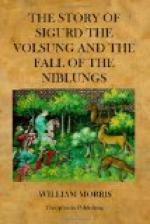He shall look through stall and stable, he shall ride by field and
fold,
And no ounce from the weight shall be lacking, of his beasts shall
lack no head,
If no thief hath stolen from Gunnar, if no beast in his land lie dead.
Yea henceforth let our lives be as one, let our wars and our
wayfarings blend,
That my name with thine may be told of when the song is sung in the
end,
That the ancient war-spent Atli may sit and laugh with delight
O’er thy feet the swift in battle, o’er thine hand uplifted to smite.”
So spake the guileful Knefrud mid
the silence of the wise,
Nor once his cold voice faltered, nor once he
sank his eyes:
Then spake the glorious Gunnar:
“We hear
King Atli’s voice.
And the heart is glad within us that he biddeth
us rejoice:
Yet the thing shall be seen but seldom that a
Niblung fares from his
land
With eyes by the gold-lust blinded, with the greedy
griping hand.
When thou farest aback unto Atli, thou shalt tell
him how thou hast
been
In the house of the Westland Gunnar, and what
things thine eyes have
seen:
Thou shalt tell of the seven store-houses with
swords filled through
and through,
Gold-hilted, deftly smithied, in the Southland
wave made blue:
Thou shalt tell of the house of the treasures
and the Gold that lay
erewhile
On the Glittering Heath of murder ’neath
the heart of the Serpent’s
guile:
Thou shalt note our glittering hauberk, thou shalt
strive to bend our
bow,
Thou shalt look on the shield of Gunnar that its
white face thou mayst
know:
Thou shalt back the Niblung war-steed when the
west wind blows its
most,
And see if it over-run thee; thou shalt gaze on
the Niblung host
And be glad of the friends of Atli; thou shalt
fare through stable and
stall,
And tell over the tale of the beast-kind, if the
night forbear to fall;
Through the horse-mead shalt thou wander, through
the meadows of the
sheep,
But forbear to count their thousands lest thou
weary for thy sleep;
Thou shalt look if the barns be empty, though
the wheat-field whiteneth
now,
In the midmost of the summer in the fields men
cared to plough;
Thou shalt dwell with men that lack not, and the
tillers fair and fain;
Thou shalt see, and long, and wonder, and tell
thy King of his gain;
For in all that here thou beholdest hath he portion
even as we;
Sweet bloometh his love in our midmost, and the
fair time yet may be,
When we twain shall meet and be merry; and sure
when our lives are done
No more shall men sunder our glory than the Gods
have rent the sun.
Sit, mighty man, and be joyous: and then
shalt thou cast us a word
And say how fareth our sister mid the glory of
her lord.”




